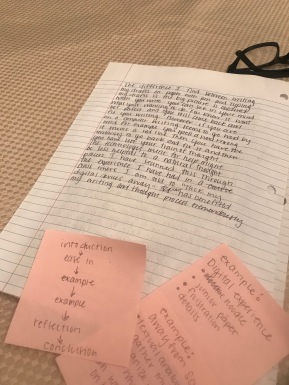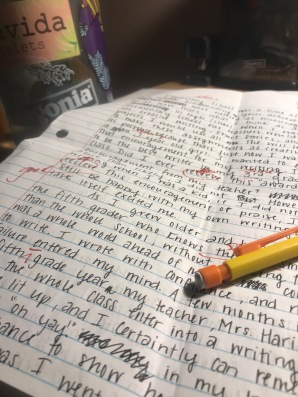“I would ask that you all tuck your digital devices away,” a phrase that rings clear in my head after weeks of being in English 111- Writing and Inquiry. Most teenagers refuse this statement in general, as if their digital device is something of a need at all times. The technology our generation has been given has influenced the way we think, communicate, and act according to Jean Twinge from The Atlantic. It is said there are good things that have come by this new technology that has been put in our possession: “fewer teens are having sex” and going out and partying, and for parents concern that is not a bad thing. However, those factors are more social statistics. Why would my English 111 professor care for digital devices to be tucked away in class? Surely she is not expecting me to go out to a party this weekend. I believe there is a greater purpose for avoiding these digital devices in a literary classroom.
Indeed, we all have our preferences as to whether writing with pen and paper or typing on a computer is better. Either way there will always be benefits to both. It really comes down to personal preferences and how your mind works. There are people who prefer to take the extra step of checking out a textbook even though a digital copy is provided online. There are the people who find it much faster to have it on their digital device. This simple preference tells us a lot about why tucking our digital devices away could be good or bad. But me, I am the person who does carry the ten-pound textbook around only to avoid the digital copy. I find it a good thing to veer away from technology in a literature classroom.
Looking back now, after I had turned my research paper in and gotten my grade back, a long two months is what it took to write it. I can not quite fathom what the issue was. I am in Advanced Placement english as a junior in high school, and I should have been easily able to finish this research paper. I struggled with the organization and structure, could not get my claim to make sense with my support, and would sit for hours in front of my computer trying to figure out how to make this a good paper. The ideas never came to me, and I could not quite understand what I was really trying to type. Half the problem was not being able to stare at a bright computer screen any longer because my eyes got tired of trying to read the small print. Our class was instructed to start this paper by making note cards on the computer and surf the web to find support.
During this process I kept losing sight of what I was actually supposed to be looking for on the internet. I almost got lost in the fifty-million websites that came up as my search results. I had finally finished this paper, and I did make a good grade, but the process was so hard because my findings, research, documentation, and drafts were not physically at hand. I would open a folder to get to a folder to get into another folder, confuse my rough draft with my final draft, and open each little notecard on the program “Noodle Tools” to view what the note cards actually said. It all came down to the expense of my screen tired mind. My mind wanted a break from the screen and drifted when it could, so my ideas were unclear and tried.
Not a computer open, not even a mouse… To put it in less lyrical terms, in English 111 no use of digital devices were permitted during this part of the writing process in which we formulated our ideas. I took my black pen out, ready to conquer a rough draft. My paper in front of me, my ideas ready to bleed onto the college ruled paper, and a hard copy of “The Falling Man”, by Tom Junod, also in front of me, I had everything I needed to scribble down the rough draft of my textual analysis. So I began to write my textual analysis on paper. Words just began to flow as if I was speaking right onto the paper. At this point, I was able to create a picture in my mind of how I wanted to organize my writing. I simply drew an arrow if the structure and organization did not seem right. My classmate asked me “why are you writing so much ?”, I answered, “It just happens.” When I was finished writing, I still had a clear picture of how I was going to organize the analysis. I knew exactly what I needed to change before I went to the computer to start writing the final digital draft. The writing process came easy to me because I was able to express my thoughts directly on paper, and I had a printed copy of my support right beside me.
There is something to say about having everything at hand rather than digitally. The differences I find between writing my drafts on paper with pen and typing my drafts may be small tedious things, but those tedious things definitely affect my writing process. I find that the big picture of my ideas are obscured when I start rough drafting on the computer. Typing on the computer seems to go word by word. For example, if I spell a word wrong it automatically shows a red line. My first instinct is to go back and correct that misspelled word, and by then I have lost my train of thought. However, when I write I know my paper is not a perfect finished product, and I know I will come back to it at some point to fix and revise it. 
The technology is less helpful for part of the writing process where you are only to be forming ideas. There are no red lines that show up automatically on your handwritten rough draft for a reason. Well of course you might have some if your getting your graded rough draft back from your professor. I think that the writing process away from the screen in English 111 has shown me my true writing abilities and a writing process that is easier for me.
Work Cited
Twenge, Jean M. “Have Smartphones Destroyed a Generation?” The Atlantic, Sept. 2017, http://www.theatlantic.com/magazine/archive/2017/09/has-the-smartphone-destroyed-a-generation/534198/.
Junod, Tom. “The Falling Man.” Esquire, Sept. 2003,www.esquire.com/news-politics/a48031/the-falling-
man-tom-junod, Accessed 10 Sept. 2018.



